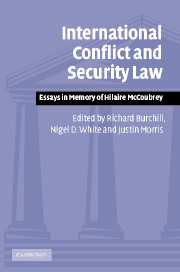Book contents
- Frontmatter
- Contents
- Biography of Hilaire McCoubrey
- Notes on contributors
- Foreword: There are men too gentle to live among wolves
- List of abbreviations
- 1 Hilaire McCoubrey and international conflict and security law
- 2 The development of operational law within Army Legal Services
- 3 Reflections on the relationship between the duty to educate in humanitarian law and the absence of a defence of mistake of law in the Rome Statute of the International Criminal Court
- 4 Superior orders and the International Criminal Court
- 5 Command responsibility: victors' justice or just desserts?
- 6 The proposed new neutral protective emblem: a long-term solution to a long-standing problem
- 7 Towards the unification of international humanitarian law?
- 8 Of vanishing points and paradoxes: terrorism and international humanitarian law
- 9 What is a legitimate military target?
- 10 The application of the European Convention on Human Rights during an international armed conflict
- 11 Regional organizations and the promotion and protection of democracy as a contribution to international peace and security
- 12 Self-defence, Security Council authority and Iraq
- 13 International law and the suppression of maritime violence
- 14 Law, power and force in an unbalanced world
- Bibliography of Hilaire McCoubrey's work
- Index
3 - Reflections on the relationship between the duty to educate in humanitarian law and the absence of a defence of mistake of law in the Rome Statute of the International Criminal Court
Published online by Cambridge University Press: 17 July 2009
- Frontmatter
- Contents
- Biography of Hilaire McCoubrey
- Notes on contributors
- Foreword: There are men too gentle to live among wolves
- List of abbreviations
- 1 Hilaire McCoubrey and international conflict and security law
- 2 The development of operational law within Army Legal Services
- 3 Reflections on the relationship between the duty to educate in humanitarian law and the absence of a defence of mistake of law in the Rome Statute of the International Criminal Court
- 4 Superior orders and the International Criminal Court
- 5 Command responsibility: victors' justice or just desserts?
- 6 The proposed new neutral protective emblem: a long-term solution to a long-standing problem
- 7 Towards the unification of international humanitarian law?
- 8 Of vanishing points and paradoxes: terrorism and international humanitarian law
- 9 What is a legitimate military target?
- 10 The application of the European Convention on Human Rights during an international armed conflict
- 11 Regional organizations and the promotion and protection of democracy as a contribution to international peace and security
- 12 Self-defence, Security Council authority and Iraq
- 13 International law and the suppression of maritime violence
- 14 Law, power and force in an unbalanced world
- Bibliography of Hilaire McCoubrey's work
- Index
Summary
[A]nd from the time [Napoleon] took up the correct fencing attitude in Moscow, and instead of his opponent's rapier saw a cudgel raised above his head, he did not cease to complain to Kutuzov and to the Emperor Alexander that the war was being carried on contrary to all the rules, as if there were rules for killing people.
Tolstoy, War and Peace, Book 14, Borodino (Wordsworth, 1993), Ch. 1, p. 812Introduction
Tolstoy's ignorance of the laws of war is probably feigned, rather than deliberate; his main thrust is at the irony of civilizing the barbaric practice of war, but more importantly for the purposes of this chapter, he also points to the possibility that many who enter combat are not aware of any legal restraint upon their actions. Today, education of potential combatants in the rules of international humanitarian law (IHL) is one of the principal duties of a state party to the Geneva Conventions. The availability and quality of this education remains, however, in doubt. Against this background the exclusion by the states parties to the Rome Statute of the International Criminal Court (ICC) of all but a very narrow defence of ignorance or mistake of law in the Statute raises questions of adherence to the principle of legality. This chapter explores the relationship between this narrow defence and the poor quality of education of combatants in IHL that currently pertains in many parts of the world.
- Type
- Chapter
- Information
- International Conflict and Security LawEssays in Memory of Hilaire McCoubrey, pp. 32 - 48Publisher: Cambridge University PressPrint publication year: 2005
- 3
- Cited by



